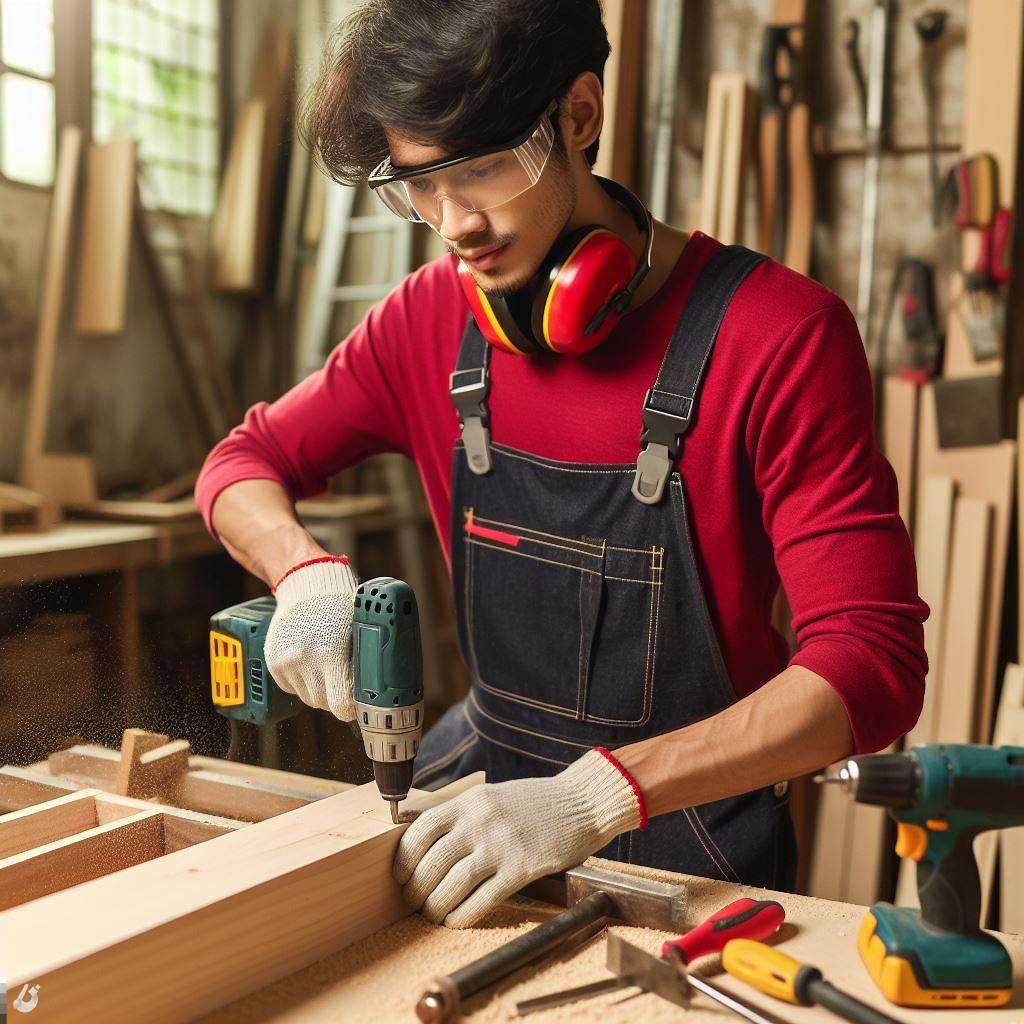Introduction
Eco-friendly practices play a vital role in the UK joinery industry.
Importance of eco-friendly practices
These practices are crucial for preserving the environment and reducing the carbon footprint.
Increasing demand for sustainable options
With construction and woodworking industries embracing environmentally friendly solutions, the demand has been soaring.
Woodworkers and contractors realize the significance of incorporating sustainable practices into their businesses.
Customers are increasingly seeking products and services that have minimal impact on the environment.
By adopting eco-friendly practices, joinery businesses can attract eco-conscious customers and gain a competitive edge.
Using sustainable materials ensures the preservation of natural resources and supports a healthier environment.
By reducing waste and implementing recycling programs, joinery businesses contribute to a more sustainable future.
Eco-friendly practices also benefit joinery businesses financially by reducing costs related to waste management.
The use of energy-efficient technologies and processes further enhances the sustainability of joinery practices.
In general, eco-friendly practices are of utmost importance in the UK joinery industry. These practices meet the increasing demand for sustainable options and contribute to a greener future.
Overview of Eco-Friendly Materials Used in Joinery
Joinery is an essential part of construction and home improvement projects, but it is important to consider the environmental impact of the materials used.
Fortunately, in the UK, there has been a growing trend towards eco-friendly practices in joinery.
This section will explore the various eco-friendly materials used in joinery today, highlighting their benefits and positive environmental impact.
The Use of Sustainable Timber and Reclaimed Wood in Joinery Projects
One of the most commonly used eco-friendly materials in joinery is sustainable timber.
Personalized UK Career Consulting
Receive tailored career guidance designed just for you. Get actionable steps and expert support to boost your career in 1-3 days. Take control of your career now.
Get StartedSustainable timber is sourced from well-managed forests where trees are harvested responsibly, ensuring the long-term health of the forest ecosystem.
This type of timber is certified by organizations such as the Forest Stewardship Council (FSC) or the Programme for the Endorsement of Forest Certification (PEFC).
Using timber from certified sustainable sources has numerous benefits. Firstly, it helps to combat deforestation by encouraging responsible tree harvesting practices.
Additionally, sustainable timber promotes biodiversity by supporting forest ecosystems and wildlife habitats.
Moreover, it reduces carbon emissions as trees absorb carbon dioxide from the atmosphere, acting as a natural carbon sink.
Reclaimed wood is another eco-friendly option in joinery. It refers to wood that has been previously used in construction or other applications and is repurposed for new projects.
By reusing this wood, valuable resources are conserved, and less waste is sent to landfill. Additionally, the production of new timber is reduced, further minimizing the environmental impact.
The Benefits of Using Timber from Certified Sustainable Sources
Choosing timber from certified sustainable sources offers multiple benefits.
Firstly, it ensures that the timber comes from forests managed in an environmentally responsible way, protecting ecosystems and wildlife habitats.
It also supports local communities that rely on sustainable forestry for their livelihoods.
Moreover, using sustainable timber helps to combat illegal logging, which is a significant environmental issue worldwide.
By purchasing certified timber, joinery professionals contribute to the elimination of illegal and unsustainable logging practices. This, in turn, promotes forest conservation on a global scale.
Another advantage of using sustainable timber is that it often possesses higher quality and durability compared to other materials.
This means that joinery projects incorporating sustainable timber are likely to have longer lifespans, reducing the need for frequent replacements or repairs.
Your Dream Job Starts with a Perfect CV
Get a tailored CV and cover letter that captures your unique strengths and stands out in your industry. Let us help you make an unforgettable first impression.
Get StartedThis longevity further contributes to environmental conservation by reducing waste generation.
The Positive Environmental Impact of using Reclaimed Wood
Reclaimed wood carries several environmental benefits. Firstly, it reduces the demand for new timber and, consequently, the need for tree harvesting.
This helps to conserve forests and maintain their crucial ecological functions, including carbon sequestration and oxygen production.
Additionally, by repurposing reclaimed wood, the carbon footprint associated with its disposal is minimized.
If this wood were to end up in landfill, it would decompose and release carbon dioxide, contributing to greenhouse gas emissions.
By using reclaimed wood in joinery projects, carbon emissions are effectively reduced.
Furthermore, utilizing reclaimed wood in joinery adds character and unique aesthetics to the final product.
Each piece of reclaimed wood tells a story and showcases the beauty of weathered and aged material, creating a distinct and environmentally-conscious design.
Other Eco-Friendly Materials like Bamboo and Recyclable Composites
In addition to sustainable timber and reclaimed wood, other eco-friendly materials are gaining popularity in joinery.
Bamboo, for instance, is renewable and can be harvested without causing damage to the plant’s complex root system.
Moreover, bamboo grows significantly faster than most trees, making it a highly sustainable choice.
Recyclable composites, such as recycled plastic lumber or composite wood made from recycled fibers, are also eco-friendly alternatives for joinery projects.
These materials divert waste from landfills and reduce the demand for new resources, effectively minimizing the environmental impact of construction and joinery activities.
In essence, eco-friendly joinery practices play a crucial role in protecting the environment and promoting sustainable construction methods.
Optimize Your LinkedIn for Success
Boost your LinkedIn profile with a professional bio, keyword-rich headline, and strategic recommendations that attract recruiters. Stand out from the crowd and get noticed.
Optimize NowThe use of sustainable timber, reclaimed wood, bamboo, and recyclable composites all contribute to reducing carbon emissions, preserving forests, and minimizing waste generation.
By embracing these materials, joinery professionals in the UK are making significant strides towards a greener and more sustainable future.
Read: Welding Certifications: Your UK Guide
Energy-efficient practices in UK joinery
Energy-efficient practices play a crucial role in the UK joinery industry. By adopting green manufacturing processes, joinery businesses can reduce their carbon footprint and contribute to a sustainable future.
The importance of energy-efficient manufacturing processes
Energy-efficient manufacturing processes are essential for several reasons. Firstly, they help conserve precious energy resources and reduce greenhouse gas emissions.
Secondly, they promote cost savings by lowering energy consumption and minimizing waste.
In the context of UK joinery, energy-efficient manufacturing processes involve utilizing advanced techniques and technologies that optimize energy use without compromising the quality of joinery products.
The use of energy-efficient machinery and equipment in joinery workshops
Joinery workshops can greatly benefit from investing in energy-efficient machinery and equipment. These tools are designed to minimize energy wastage by using advanced mechanisms and materials.
For example, joinery workshops can replace traditional woodworking tools with energy-efficient alternatives that consume less power while delivering the same level of performance.
Additionally, the use of energy-efficient equipment such as LED lighting and motion sensors can help reduce electricity consumption in joinery workshops.
The increasing trend towards renewable energy sources in joinery businesses
With growing awareness about the need for sustainable practices, joinery businesses in the UK are increasingly turning to renewable energy sources.
Solar power is one renewable energy option that is gaining popularity in the joinery industry.
By installing solar panels on workshop roofs, joiners can generate clean electricity and reduce their reliance on fossil fuels. Furthermore, wind energy is another viable option for powering joinery workshops.
Utilizing small wind turbines can harness the power of wind to generate electricity, resulting in a greener and more sustainable operation. Finally, biomass heating systems are gaining traction in the joinery industry.
These systems use organic materials such as wood pellets or chips to generate heat, providing a renewable alternative to traditional heating methods.
In review, energy-efficient practices, machinery, equipment, and the adoption of renewable energy sources are crucial for promoting sustainability in the UK joinery industry.
By prioritizing energy efficiency, joinery businesses can contribute to a greener future while also reaping the benefits of cost savings and reduced environmental impact.
Read: Essential Safety Gear for Welders in the UK
Waste reduction and recycling initiatives
In contemporary UK joinery, minimizing waste is paramount. Innovative techniques reduce material waste during manufacturing.
The importance of recycling wood waste cannot be overstated. It aligns with the goal of promoting a circular economy.
Joinery projects embrace upcycling, giving discarded materials new life. This sustainable practice contributes to environmental conservation.
Efforts to minimize waste generation in joinery align with eco-friendly practices. Innovative techniques reduce material waste during manufacturing.
Recycling wood waste contributes to a circular economy. Joinery, incorporating upcycling, enhances sustainability by repurposing discarded materials.
Basically, waste reduction and recycling initiatives are integral to eco-friendly practices in modern UK joinery.
Read: The Future of Welding Jobs in the UK Market

Green certifications and sustainable standards in UK joinery
The significance of green certifications like FSC and PEFC
Green certifications, such as the Forest Stewardship Council (FSC) and the Programme for the Endorsement of Forest Certification (PEFC), play a crucial role in promoting sustainable practices in the UK joinery industry.
These certifications guarantee that wood products come from responsibly managed forests, where environmental impact is minimized, and social and economic benefits are maximized.
The rigorous criteria and auditing processes involved
To obtain green certifications, joinery companies must meet strict criteria, including maintaining sustainable forestry practices, respecting local communities’ rights, and conserving biodiversity.
Regular audits are conducted to ensure compliance with these criteria, covering every stage of the supply chain, from forests to manufacturing processes.
Other sustainable standards for joinery products, such as Cradle to Cradle certification
In addition to FSC and PEFC, the Cradle to Cradle certification system promotes sustainable joinery products by assessing their environmental performance throughout their lifecycle.
This holistic approach evaluates material health, reuse potential, renewable energy use, carbon management, and water stewardship.
The benefits of using certified eco-friendly joinery products for both businesses and consumers
For Businesses
- Enhanced reputation and market competitiveness through environmental responsibility.
- Access to environmentally conscious customers who prioritize eco-friendly products.
- Compliance with sustainability regulations, leading to potential business opportunities.
- Improved employee morale and satisfaction, contributing to a positive work environment.
- Reduction in long-term costs by promoting resource efficiency.
For Consumers
- Confidence in purchasing products with lower environmental impact and sustainable sourcing.
- Support for responsible forestry practices and protection of natural resources.
- Healthier indoor environments due to reduced exposure to harmful chemicals and toxins.
- Investment in durable and long-lasting joinery products, minimizing waste and replacements.
- Alignment with personal values and contributing to a more sustainable future.
Generally, green certifications like FSC, PEFC, and sustainable standards like Cradle to Cradle have transformed the UK joinery industry into a hub of eco-friendly practices.
By adhering to rigorous criteria and undergoing auditing processes, joinery companies demonstrate their commitment to sustainability.
The use of certified eco-friendly joinery products benefits both businesses and consumers, promoting environmental responsibility and creating a more sustainable future.
Read: Average Welder Salaries in the UK: 2024 Update
Case studies of successful eco-friendly joinery projects in the UK
There are several notable examples of eco-friendly joinery projects in the UK that have achieved great success. These projects serve as inspiration for other joinery businesses to implement sustainable practices.
Joinery Businesses Implementing Sustainable Practices
1. Green Joinery Co.
- Uses reclaimed wood from old furniture and buildings for their projects.
- Invests in energy-efficient machinery to minimize carbon emissions.
- Adopts waste reduction strategies by recycling and repurposing materials.
2. Sustainable Craftsmen Ltd.
- Sources timber from local sustainable forests, promoting responsible forestry.
- Employs skilled craftsmen who specialize in using traditional joinery techniques.
- Offers customization options that allow clients to design timeless and durable products.
3. Eco-Joinery Solutions
- Uses low VOC (Volatile Organic Compound) paints and finishes to minimize environmental impact.
- Incorporates energy-saving features in their joinery installations, such as double glazing.
- Provides maintenance services to ensure longevity of their products, reducing replacements.
Eco-Friendly Measures Taken
These eco-friendly joinery projects employ specific measures to reduce their ecological footprint:
- Use of reclaimed wood: By utilizing salvaged wood, these businesses prevent deforestation and reduce waste.
- Investment in energy-efficient machinery: By using advanced technology, energy consumption and carbon emissions are minimized.
- Waste reduction strategies: Recycling and repurposing materials not only save resources but also contribute to a circular economy.
Positive Outcomes and Customer Satisfaction
The adoption of sustainable practices in joinery projects yields positive outcomes and high customer satisfaction.
- Environmental Benefits: These eco-friendly joinery projects contribute to a greener future by reducing carbon emissions and promoting responsible sourcing.
- Energy Efficiency: Implementation of energy-saving measures improves energy efficiency in buildings, leading to lower utility bills and increased comfort.
- Durability and Quality: By using reclaimed materials and traditional craftsmanship, the joinery products exhibit exceptional quality and longevity.
- Customer Appreciation: Clients value the commitment towards sustainability, resulting in higher customer satisfaction and positive brand reputation.
Essentially, the case studies of successful eco-friendly joinery projects in the UK demonstrate the positive impact of implementing sustainable practices.
Joinery businesses that prioritize eco-friendly measures, such as using reclaimed wood, energy-efficient machinery, and waste reduction strategies.
This not only contribute to environmental conservation but also benefit from improved customer satisfaction and business reputation.
Conclusion
Eco-friendly practices in the UK joinery industry are not just a trend but a necessity for a sustainable future.
Adopting environmentally conscious methods and materials is crucial to minimize the impact of joinery activities on the environment.
The importance of eco-friendly practices lies in their ability to conserve natural resources, reduce carbon footprints, and contribute to overall environmental health.
By prioritizing sustainable joinery, businesses can actively participate in the global movement toward greener practices. The benefits of eco-friendly joinery extend beyond environmental considerations.
Utilizing sustainable materials often results in higher-quality products that resonate well with environmentally conscious consumers.
This not only enhances a business’s reputation but also opens up opportunities for growth in a market increasingly focused on sustainability.
Moreover, eco-friendly practices can lead to cost savings for joinery businesses in the long run.
Efficient use of resources and waste reduction measures contribute to lower operational costs, making sustainable practices economically viable.
Joinery professionals are urged to prioritize eco-friendly practices in their operations. This includes sourcing materials responsibly, adopting energy-efficient processes, and incorporating waste reduction strategies.
By doing so, joiners contribute to a healthier planet while positioning their businesses for long-term success in an environmentally conscious market.
In summary, the adoption of eco-friendly practices in the UK joinery industry is more than a choice; it is a responsibility.
The benefits extend from environmental conservation to business growth and cost savings. Joinery businesses and professionals are encouraged to lead the way in sustainable practices for a greener future.
[E-Book for Sale]
500 Cutting-Edge Tech Startup Ideas for 2024 & 2025: Innovate, Create, Dominate
$19.99 • 500 Tech Startup Ideas • 62 pages
You will get inspired with 500 innovative tech startup ideas for 2024 and 2025, complete with concise descriptions to help you kickstart your entrepreneurial journey in AI, Blockchain, IoT, Fintech, and AR/VR.




